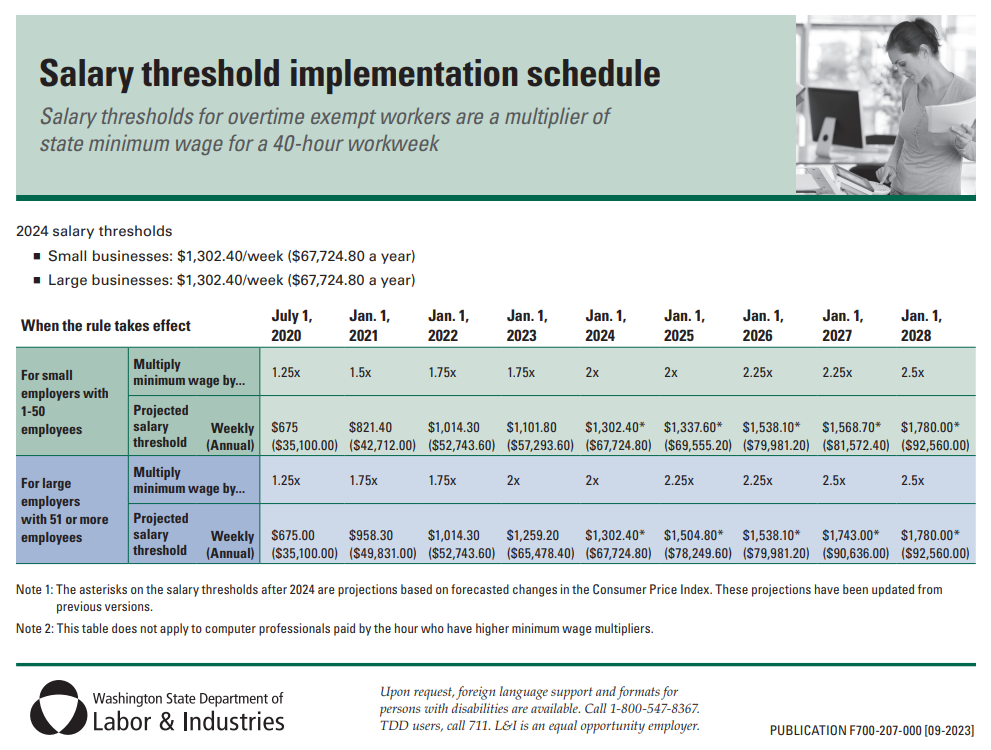
The Washington State Department of Labor & Industries (L&I) makes a cost-of-living adjustment annually to the minimum wage based on the federal Consumer Price Index for Urban Wage Earners and Clerical Workers (CPI-W). You can read all about minimum wage in Washington here.
The Washington state minimum wage for 2024 was increased to $16.28 per hour effective Jan. 1, 2024.
The state minimum wage applies to workers aged 16 and older. Under state law, employers can pay 85 percent of the minimum wage to workers ages 14-15. For 2024, the wage for that younger group will be $13.84 per hour.
Seattle
The city of Seattle’s Office of Labor Standards (OLS) announced its 2024 minimum wage on Oct. 16.
As of Jan. 1, 2024, the minimum wage in Seattle increased to:
- $19.97/hour – Large employers (501 or more employees)
- $19.97/hour – Small employers (500 or fewer employees) who do not pay at least $2.72/hour toward the employee’s medical benefits and/or where the employee does not earn at least $2.72/hour in tips.
- $17.25/hour – Small employers who do pay at least $2.72/hour toward the employee’s medical benefits and/or where the employee does earn at least $2.72/hour in tips.
SeaTac
The city of SeaTac announced its 2024 minimum wage on Oct. 6. As of Jan. 1, 2024, the new minimum wage in SeaTac increased to $19.71 for employees who work in the transportation and hospitality industries.
Tukwila
Large employers with more than 500 employees in Tukwila must pay $20.29 starting Jan. 1, 2024.
Mid-sized employers with between 15 and 499 employees must pay $18.29 starting Jan. 1, 2024, and $19.29 starting July 1, 2024.
Employers with fewer than 15 employees that make less than $2 million in annual revenue are not subject to these new wages, but must pay the state minimum wage of $16.28 per hour.
The 2024 overtime threshold is two times the minimum wage. That means an exempt employee will have to earn at least $1,302.40 a week ($67,724.80 a year).
As of July 1, 2020, Washington state implemented new laws for salaried employees: depending on how much they make, they are entitled to overtime for any hours worked more than 40 hours a week.
There is an eight-year implementation schedule that incrementally raises the multiplier until it reaches 2.5 times the minimum wage in 2028. The pace of the increase is based on the size of the employer.
You can download this schedule here.
The 2024 minimum salary for exempt employees working for all employers is two times the minimum wage. That means an employee exempt from overtime pay must earn at least $1,302.40 a week ($67,724.80 a year).
Most employees who work more than 40 hours in a seven-day workweek must be paid overtime. Overtime pay must be at least 1.5 times the employee’s regular hourly rate. Other overtime rates, like double-time pay are not required under Washington state law.
Use this tool to estimate a budget for the overtime cost if an employee is classified as non-exempt.
Employees cannot waive their right to overtime pay.
- Employers must pay overtime to eligible workers regardless of the employer’s size.
- Employers can mandate overtime work.
- Collective bargaining agreements and employers can provide overtime pay more generous than Washington law requires.
Private employers are not allowed to enter “comp time” agreements with employees where employees are eligible for additional paid time off in lieu of paying overtime.
If you would like to attend a webinar from L&I in which you will learn about the overtime rules, including the job duties tests for each exemption category, click here and choose “White-collar overtime exemptions” from the drop-down menu under “Events.”
Overtime exempt employees
In 2020 L&I updated Washington’s overtime rules which apply to “white collar” positions held by executive, administrative, and professional workers, plus computer professionals and outside salespeople.
A worker must earn at least the minimum salary, and their duties must meet a job duties test to be exempt from earning overtime. The minimum salaries are a multiplier of the minimum wage.
A worker is judged non-exempt by job duties, not a job title or description. Their duties determine whether a job primarily involves executive, administrative, professional, computer professional, or outside sales duties as defined in the rules.
- Employers may convert salaried employees to hourly and pay them overtime if they work more than 40 hours a week.
- They may also choose to leave them as salaried employees and pay them overtime when they work more than 40 hours a week.
- They can also choose to maintain the employee’s status as a salaried employee and limit their hours to just 40.
Is my employee exempt?
An employee meets the executive exemption if they have a primary duty of managing the business or a department or subdivision of the business. They also customarily direct the work of two or more employees. They also have the authority to hire, fire or promote employees or their recommendations about hiring, firing and promoting holds a particular weight. They are paid on a salary basis and the amount they are paid is equal to or greater than the salary threshold.
An employee meets the administrative exemption if they perform non-manual work, and their duties are related to managing or operating a business or the business of their employer’s customers. They have decision-making authority about important matters. They are paid on a salary basis and the amount they are paid is equal to or greater than the salary threshold.
An employee meets the learned professional exemption when their job requires advanced knowledge in an intellectual field and has received lengthy certified instruction, such as a graduate degree. They consistently use discretion and judgement in performing their duties. A creative professional employee does work that is creative or artistic. It requires invention, originality or talent. These two employees must be paid on a salary basis and are paid as much or more than the salary threshold.
For an in-depth learning tool for this information, click here.
Other resources
L&I has a very robust site with many resources about the overtime threshold. Find everything you need here.
Attorneys from Miller Nash, a law firm that is part of the Washington Hospitality Association’s Advisory Network, presented a webinar about all the new and changing laws for 2023. You can find it here, as a toolkit here or read up on FAQs from the webinar, which includes the overtime threshold here.
As of Jan. 1, 2023, employers with 15 or more employees are required to include salary and benefits information in job postings.
Employment law attorney and association allied member Catharine Morisset co-authored an excellent post with Dean Petitta about this new requirement. They explain the details within the new law, highlight the differences between external and internal job posting and provide a three-step plan employers can follow.
Catharine also hosted a webinar on Washington’s new job posting requirements. In case you missed it, head over to the members only site to get a full recap of Catharine’s presentation.
























